
Contemplating one’s future while in high school can be daunting, but having a mentor-nurtured community can transform this task into an invigorating experience. The Caminos program connects Spanish speakers at Fort Collins High School with Latin American and Indigenous Colorado State University students and community members for community, support, and mentorship as they explore paths for their futures.
Nearing its 10th year, the program — started and organized by a team of educators, including School of Education Associate Professor Antonette Aragon — has helped hundreds of students as they launch beyond high school. Aragon explained that prior program participants are returning to be mentors or femtors. “I am so proud that many of the current fem/mentors were once Caminos students at FCHS themselves,” she said. According to these fem/mentors, this gives them a unique way to connect with the high school students.
Walking in their shoes: Santiago
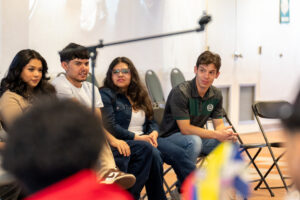
“I literally walked in their shoes,” said Santiago Pinedo Fuentealba, a fourth-year CSU student studying biomedical sciences and Spanish. “I was a student at Fort Collins High and met other Caminos mentors when I was there. It really helps them to be able to talk to someone with similar experiences. I love getting to know these kids as a mentor here.”
Pinedo Fuentealba met Caminos fem/mentors for the first time during his first year of high school in his Spanish class. “At that point, I wasn’t even thinking about college. I almost didn’t even know what it was,” he said. “What Caminos did for me that Freshman year and beyond, was introduce me to what college is and showed me that it was something I was capable of doing.”
Even though Pinedo Fuentealba chose to pursue CSU, Caminos fem/mentors encourage FCHS students to consider any educational or career path that will set them up for success. “While college is an option, they tell you about all the options,” he said.
“The transition from being a student to a mentor has been really rewarding to me, because I got to continue on with all of these relationships that had already been forming,” he said.
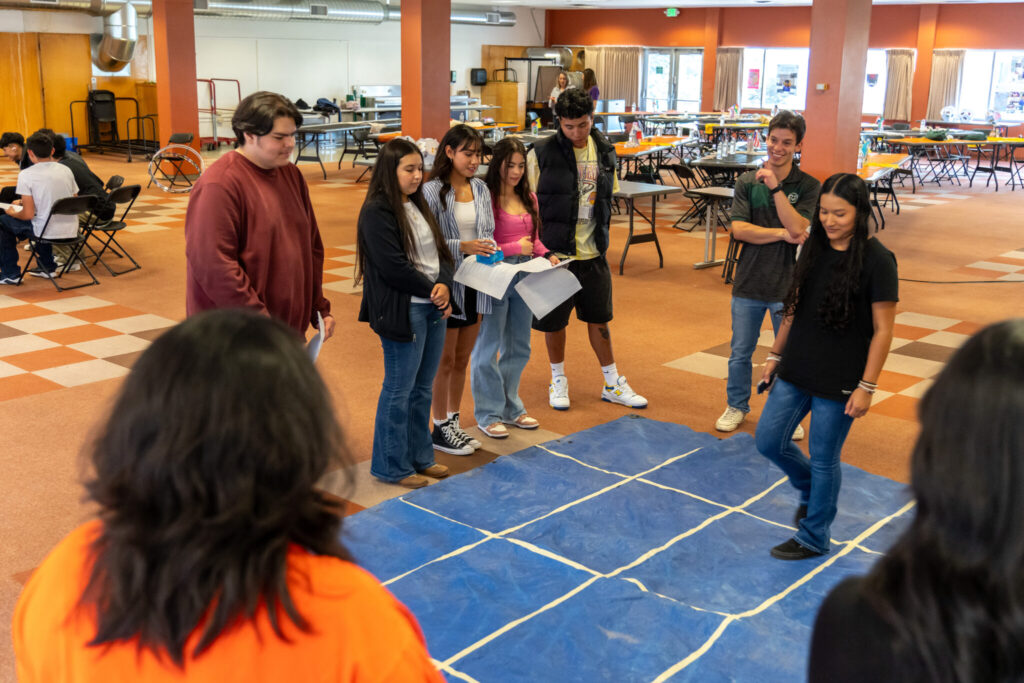
Two languages as an asset: Emily
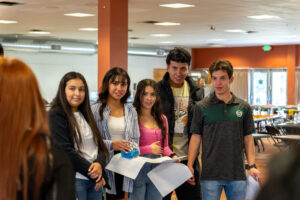
“You don’t really realize the impact the Caminos program can have until you see it or experience it,” said Emily Rodriguez, a first-year animal sciences student at CSU.
Rodriguez’s first experience with Caminos was in her first year of high school, where fem/mentors shared how being a native Spanish-speaker influenced their success in the world.
“When I came to CSU, I wanted to continue to be involved in Caminos,” she said. “I wanted to teach kids to know their history and appreciate where they come from and encourage them to keep studying.”
Rodriguez notes that for many first-generation Latine students, college or another kind of post-secondary education or training isn’t often discussed at home. Even into her junior year of high school, she was convinced she wasn’t going to college. Rodiguez has known Pinedo Fuentealba since middle school, and it was talking to him about CSU that helped her start thinking about attending.
“Caminos helped me realize that speaking two languages is an asset,” she said. “It’s a great program to encourage you and tell you ‘Yes, you have potential and can aspire to do more.’ That was really encouraging to me, and those mentors helped me see that in myself.”
Rodriguez regularly visits friends and family in Jalisco, Mexico. In those visits, she fostered a passion for both livestock and domestic animals. Pursuing her passion, she is working towards attending veterinary school to be a livestock vet.
Encouraging students to succeed academically: Zaid
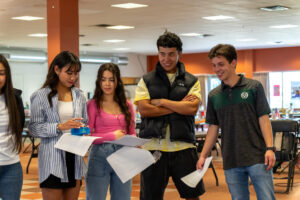
Zaid Garcia’s dream after high school was to be a barber. “I thought I was just going to learn how to cut hair, so I didn’t always pay attention to my schoolwork,” he said. “When I went to barber school, I had to learn all about electricity, chemistry, and how to do taxes.”
Like other students, Garcia got connected to the Caminos program through his Spanish class at Fort Collins High School. Now, he’s returned as a mentor to encourage current FCHS students to do their best academically and think about their future.
“When I was in barber school, it was harder for me because I didn’t care in high school. Everyone else in barber school understood this stuff,” he said.
Garcia still remembers his first Caminos mentor, David, who made a serious impact on him in his first year of high school. “He told us you can still have fun and be successful. He’d tell us stories about how he grew up poor and was in an accident but went to college anyway. He helped me be a better person. Seeing someone like him be able to finish school was inspiring,” Garcia said.
“David would say, ‘People see Hispanics as construction workers, but wouldn’t it be cool if we saw a Mexican lawyer or fireman? How cool would that be?’ I saw that in David and wanted to be like him,” Garcia said.
After working as a barber and volunteering as a Caminos mentor, Garcia was invited to apply to work at FCHS as a paraprofessional. He also coaches soccer at the middle and high school levels. “I have a lot of Hispanic kids on the soccer team. It’s great to see them grow in more than one place,” he said.
“Now I tell the kids I work with, if you want to be a mechanic, a tattoo artist, or whatever it is you want to do, you need to pay attention in school,” Garcia said. “I wanted to come back to tell them my experience. You might not think you need it, but you do.”
Inspiring first-gen women in STEM: Briseida
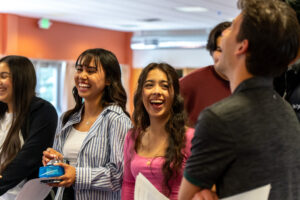
Briseida Najera said she wouldn’t be a student at CSU if it weren’t for the Caminos Program. “The mentors would talk about their experiences as college students and encourage us to think about what we were going to do after graduation,” she said.
One of those femtors introduced Najera to computer science, which is now her major. “That was really special to me because as a first-generation student, I don’t really have anyone to talk about the college experience with,” she said. “Being able to talk to them [the fem/mentors] and see how they navigate things and what their lives look like is really special to me.”
Najera said she came back to Caminos to inspire other young women to think about going into STEM. “Being both first-gen and a woman in STEM can be difficult, and it was my goal to go back to high school students and inspire other women.”
Thank you to these community organizations for their support of the Caminos Program: Canvas Federal Credit Union, Blue Federal Credit Union, Alpine Bank, New Belgium Brewering Company, PSD Foundation, CSU TILT Community Engaged Learning Grant.
The School of Education is part of CSU’s College of Health and Human Sciences.